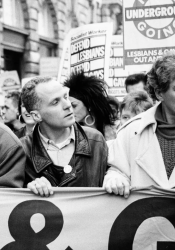Clause 28: Prohibition on Promoting Homosexuality by Teaching or by Publishing Material
Section 28 or Clause 28 was part of a series of laws across Britain that banned the promotion of homosexuality by local authorities. It went into effect from May 24, 1988, to November 18, 2003. In 1986 to be exact, it was introduced by David Wiltshire, a Conservative, in which the bill prohibited local authorities from: “intentionally promoting homosexuality or publish material with the intention of promoting homosexuality” or “promote the teaching in any maintained school of the acceptability of homosexuality as a pretended family relationship” (qtd. in McGhee).
In an article by Sue Sanders and Gill Spraggs which was first published in “Learning Our Lines: Sexuality and Social Control” edited by Carol Jones and Pat Mahoney, they stated how:
During the last few years the presentation of lesbian and gay issues has become inextricably intwined in the public mind with party politics, a tendency which came to a head in the campaign surrounding the notorious Clause 28 of the Local Government Bill 1988. During the same time, the field of education, and especially school-based education, has become established as a key site of conflict and confusion. How has this come about?” (Sanders and Spraggs). To be specific, it was only in effect from 1988 to 2000 in Scotland and 2003 in England and in Wales. The damage and legacy this section had 34 years ago it had caused is still felt and remembered even today. It took a decade to repeal Section 28 and it will take a long time for the generation of LGBT youth and teachers to heal from.
Kelly Ann Cecillia McGhee, a volunteer who spend a few months in the archive researching material regarding Section 28 by the Conservative Government in the 1980s wrote an article called “The Destruction Caused by Clause 28.” In her article, she highlights how “pupils who experienced prejudice were unable to voice the discrimination that they faced, and little counselling or support was available to families or children” (McGhee). This section in some way is like the “Don’t Say Gay” bill which was passed by the Florida Senate on March 8th which aims to restrict schools from teaching students about their sexual orientation and gender identity. Moreover, she also adds that “certain books were also prohibited from classrooms, teachers were also unable to disclose their sexuality in fear of losing their jobs and teachers and parents were no longer in control of what sexual education their pupils or children received” (McGhee). This is not something anyone should have to experience and fear like it is something that is inevitable. The effect of Section 28 defined social attitudes towards homosexuality, gay, and lesbian people that left them feeling unsafe and commonly drew dangerous comparisons between homosexuality and criminal behavior (McGhee). One quote that has stuck with me for quite some time now is by Emma Watson, which she mentioned: “It is time that we all see gender as a spectrum instead of two sets of opposing ideals.”
A writer and blogger who specializes in US politics, Joe Sommerlad elaborated on Section 28 more in his article titled “Section 28: What was Margaret Thatcher’s controversial law and how did it affect the lives of LGBT+ people?” According to Sommerlad, Ms. Thatcher, is responsible for the first new homophobic law to be introduced in a century, in which she had once said that “Children who need to be taught to respect traditional moral values are being taught that they have an inalienable right to be gay" (qtd. in Sommerlad). The clause had a pernicious influence in legitimizing hate and the increase in homophobia and bullying, which demonized LGBT+ children. Like the clause, the “Don’t Say Gay” bill will make many stay imprisoned in the closet for fear or social reprisal, disapproval, or worse.
Works Cited:
McGhee, Kelly Ann Cecillia. “The Destruction Caused by Clause 28.” Glasglow Women’s Library,
Sanders, Sue, and Gill Spraggs. “Section 28 and Education.” The Women’s Press, 1989,
Sommerlad, Joe. “Section 28: What was Margaret Thatcher’s controversial law and how did it affect the lives of LGBT+ people?” Independent, 25 May 2018,

